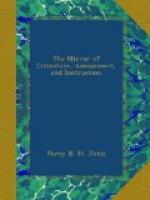THE SKETCH BOOK
No. XLIX.
* * * * *
THE AUBERGE.
(For the Mirror.)
“Tais-toi, Louise,” exclaimed the landlady of a small but neat auberge at ------ to her daughter, a sweet child, about seven years of age, who, playing with a little curly French dog, was sitting on a three-legged stool, humming a trifling chanson which she had gleaned from a collection of ditties pertaining to an old woman, who, when the landlady might be busily engaged, attended the infant steps and movements of Louise. “Tais-toi, ecoutez, la diligence s’approche;” the truth of the good woman’s remark being vouched for by the heavy rumbling of that ponderous machine, the “Vite, vite” of the postilion, and the “crack, crack” of his huge whip. This was shortly after the battle of Waterloo, when our troops, crowned with laurels, were hastily leaving the continent, burning with anxiety to revisit their native soil, and their countrymen of the peace department were as hastily leaving it, fired with curiosity to behold the spot where such laurels had been so hardly earned. At least such was undoubtedly the most prevalent cause of the great influx of continental visiters at that period; but there were, by way of contrast to these votaries of curiosity, too many whose contracted brow and thoughtful melancholy cast of visage betrayed forcibly their owners’ curiosity to be otherwise and more feelingly worked upon; ’twas the anxiety, the wish to gather information respecting relatives or friends, killed or wounded in the late dire struggle, which had caused those appearances. But to my subject. ’Twas at the close of a very hot July day that the diligence drew up to the door of the before-mentioned auberge. “A diner,” as the postilion (nearly smothered in his tremendous “bottes fortes,” genteelly taking from his head a hat almost as small as the boots were in comparison large) was politely pleased to term it. No pressing invitation was requisite to incline our English travellers to take their seats around the table well arranged with French fare, and fatigue seemed to lose itself in the exhilaration proceeding from the chablis, champagne, and chambertin; but there was one traveller, whose melancholy defied eradication—an English lady, genteelly but plainly habited, to appearance about seven and twenty years of age; her features handsome and strongly marked; when in health of mind and body, they might have possessed the “besoin du souci,” habitual to the country in which she was then travelling, but were now too deeply clouded with that “apparence de la misere,” to which the English seem alone to give fullness of effect—a fault, perhaps, but a sentimental one, worthy of that or any other country. She had with her a beautiful boy, whose age might be about five, who, attracted partly by the pretty appearance of the dog, by signs




